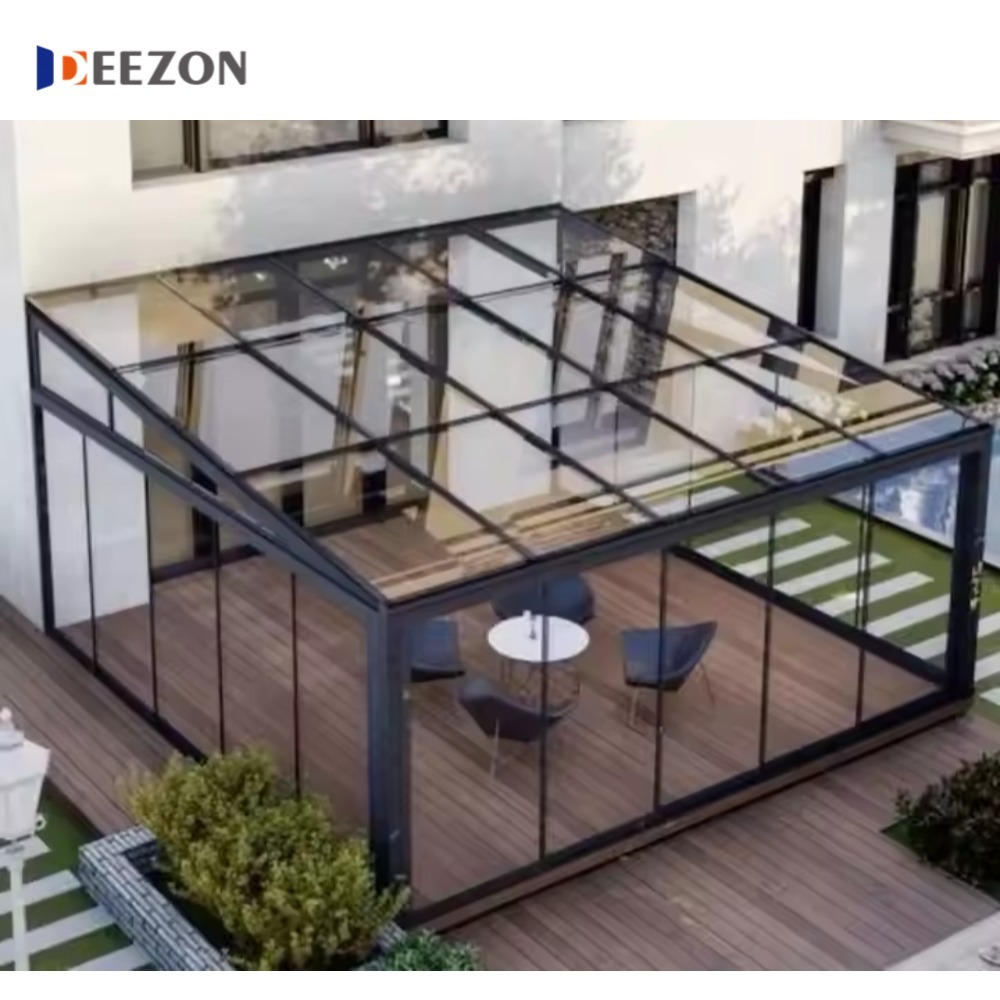Foshan Deezon Windows and Doors Co.,Ltd.
language
The Future of Gardening: Embracing Smart Technology in Aluminum Greenhouses
Jul 01,2025

The Future of Gardening: Embracing Smart Technology in Aluminum Greenhouses
Table of Contents
- Introduction to Smart Gardening Solutions
- What is an Aluminum Greenhouse?
- Benefits of Aluminum Greenhouses
- Smart Technology in Gardening
- Sustainable Gardening Practices with Technology
- Future Trends in Gardening
- Case Studies: Successful Implementation of Smart Technology
- Frequently Asked Questions
- Conclusion
Introduction to Smart Gardening Solutions
Gardening has evolved significantly over the years, transitioning from traditional practices to more advanced, technology-driven methods. In this age of rapid technological advancement, **smart technology** is paving the way for a new era in gardening, particularly in the context of **aluminum greenhouses**. These structures have become synonymous with durability, efficiency, and sustainability, making them an ideal platform for integrating smart technologies.
By embracing these innovations, gardeners can not only enhance their productivity but also engage in a more sustainable practice that resonates with the growing global emphasis on environmental conservation. This article delves into how **smart technology** is reshaping the future of gardening in aluminum greenhouses, exploring the benefits, the latest trends, and sustainable practices that are emerging in this sector.
What is an Aluminum Greenhouse?
An aluminum greenhouse is a structure made primarily from aluminum frames and panels that provide a controlled environment for plants to grow. These greenhouses offer several advantages over traditional wooden or plastic structures, including:
- **Durability:** Aluminum is resistant to rust and corrosion, ensuring a longer lifespan for your greenhouse.
- **Lightweight Design:** The lightweight nature of aluminum makes it easier to install and manage.
- **Low Maintenance:** Unlike wooden greenhouses, aluminum does not require frequent upkeep, reducing overall maintenance costs.
Aluminum greenhouses can be fitted with various technology-driven solutions that optimize plant growth, allowing gardeners to cultivate a wide range of plants year-round, regardless of external weather conditions.
Benefits of Aluminum Greenhouses
Aluminum greenhouses provide numerous benefits, particularly when combined with **smart technology**:
1. **Optimized Growing Conditions:** With the ability to regulate temperature, humidity, and light levels, aluminum greenhouses can create ideal growing conditions for various plants.
2. **Energy Efficiency:** Smart technologies enable energy-efficient heating and cooling systems, reducing energy consumption and operating costs.
3. **Extended Growing Seasons:** By creating a controlled environment, gardeners can grow crops outside of their typical growing seasons, maximizing yield and profitability.
4. **Automated Management:** Smart sensors and automation allow for real-time monitoring of environmental conditions, leading to better decision-making in plant care.
Smart Technology in Gardening
The integration of smart technology into gardening is transforming traditional practices and enabling more efficient and sustainable methods. Several key technologies are making waves in the industry:
Automation in Greenhouses
Automation plays a crucial role in modern gardening. From automated irrigation systems to climate control, automation helps gardeners manage their greenhouses with minimal effort. Key features of automated systems include:
- **Irrigation Control:** Smart irrigation systems can schedule watering times based on soil moisture levels, ensuring that plants receive the right amount of water at the right time.
- **Climate Control Systems:** Automated thermostats can adjust temperature and ventilation to maintain optimal growing conditions, enhancing plant health and growth rates.
- **Lighting Control:** Automated lighting systems can simulate natural sunlight, helping to promote photosynthesis and supporting plant development even in low-light conditions.
IoT Integration in Gardening
The Internet of Things (IoT) is revolutionizing gardening by connecting devices and systems to the internet for enhanced communication and data collection. IoT integration in aluminum greenhouses can lead to:
- **Remote Monitoring:** Gardeners can monitor greenhouse conditions in real-time via smartphone apps, allowing for timely interventions and adjustments.
- **Data Analytics:** By collecting and analyzing data on plant growth and environmental conditions, gardeners can make informed decisions that enhance productivity and sustainability.
- **Predictive Maintenance:** IoT-enabled sensors can detect equipment malfunctions early, allowing for proactive maintenance and avoiding costly downtimes.
Sustainable Gardening Practices with Technology
As environmental concerns continue to rise, sustainable gardening practices are increasingly in demand. Smart technology facilitates these practices by promoting resource efficiency and reducing waste. Some key sustainable practices include:
- **Water Conservation:** Automated irrigation systems drastically reduce water waste by providing precise watering based on plant needs.
- **Energy Efficiency:** Smart climate control systems optimize energy use by only activating when necessary, contributing to lower greenhouse gas emissions.
- **Organic Growing:** Technologies allow for better pest control and disease management, enabling organic farming practices that minimize chemical use.
Future Trends in Gardening
The future of gardening is set to be shaped significantly by ongoing advancements in technology. Key trends to watch include:
1. **Vertical Gardening:** With urbanization on the rise, vertical gardening, often facilitated by smart technology, allows for efficient space utilization.
2. **Hydroponics and Aquaponics:** These soil-less growing methods are becoming more mainstream, providing sustainable options for urban gardeners.
3. **AI and Machine Learning:** Artificial intelligence will play a role in predicting plant needs and optimizing growth conditions based on historical data.
With these trends, gardeners can expect to see even more innovative solutions that enhance productivity, sustainability, and overall gardening experiences.
Case Studies: Successful Implementation of Smart Technology
Several successful case studies highlight the effectiveness of smart technology in aluminum greenhouses:
- **Case Study 1: Urban Hydroponics Farm:** A city-based hydroponic farm integrated IoT sensors and automation to optimize its water usage and nutrient delivery, resulting in a 30% increase in crop yield while reducing water consumption by 40%.
- **Case Study 2: Commercial Greenhouse Operations:** A commercial greenhouse utilized automated climate control systems, leading to more consistent growing conditions and a 25% reduction in energy costs.
These examples illustrate the tangible benefits of adopting smart technologies within aluminum greenhouses, showcasing the immense potential to transform the gardening landscape.
Frequently Asked Questions
1. What are the main benefits of using aluminum greenhouses?
Aluminum greenhouses offer durability, low maintenance, and energy efficiency, creating an ideal environment for plant growth.
2. How does smart technology improve gardening practices?
Smart technology enhances gardening practices by automating processes, optimizing resource use, and providing real-time monitoring capabilities.
3. What is the role of IoT in gardening?
IoT connects devices and systems for real-time data collection and analysis, facilitating better decision-making and automation in gardening.
4. Can I grow organic plants in an aluminum greenhouse with smart technology?
Yes, smart technology can support organic growing practices by improving pest management and resource efficiency.
5. What trends should I expect in the future of gardening?
Expect to see increased adoption of vertical gardening, hydroponics, and AI-driven solutions in gardening practices.
Conclusion
The fusion of smart technology and aluminum greenhouses is ushering in a new era of gardening, characterized by sustainability, efficiency, and productivity. As gardeners continue to embrace these advancements, the possibilities for optimizing plant growth and reducing environmental impact become ever more promising. By adopting smart technologies, we not only enhance our gardening practices but also contribute to a more sustainable future for all. This proactive approach to gardening is essential in meeting the challenges posed by climate change and growing populations, paving the way for a greener, more productive world.






